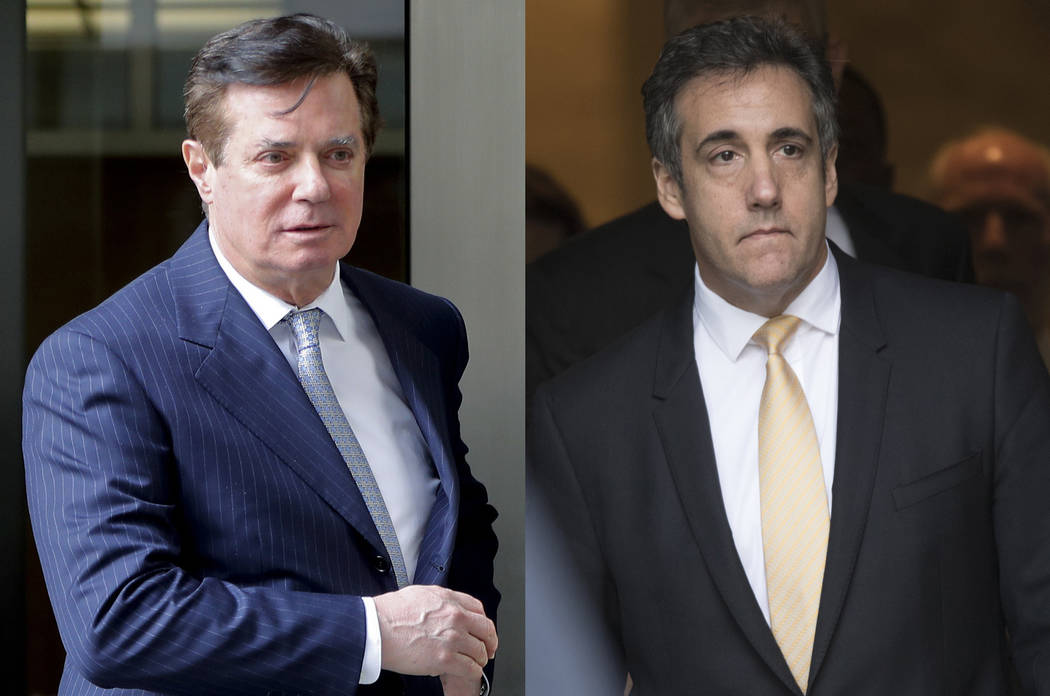Why Trump see bias at the Justice Department — analysis
WASHINGTON
“Double standard?” President Donald Trump guffawed after Fox News anchor Ainsley Earhardt asked if federal law enforcement has a double standard for how it handles allegations of wrongdoing by Republicans and Democrats.
Trump offered a little list of big disparities.
For starters, Trump named “Awan,” as in Imran Awan, a former House Democratic IT staffer, who pleaded guilty to one count of lying on a loan application and was sentenced Tuesday in a federal court in Washington.
The same day, a federal jury in Virginia found former Trump campaign chairman Paul Manafort guilty of five counts of tax fraud, two counts of bank fraud and one count of failing to disclose foreign bank accounts.
The charges stem from special counsel Robert Mueller’s probe into Russian interference in the 2016 election, even though they have nothing to do with the 2016 campaign or Russia.
A Republican, the 69-year-old Manafort faces up to 30 years in prison just for each of the two convictions for obtaining huge loans based on false information.
Meanwhile, a federal judge sentenced Awan to time served — one day of detention and 11 months of GPS monitoring, according to The Washington Post — and three months’ supervision for a similar offense.
“He got nothing,” Trump complained to Fox.
The difference? Manafort’s liar loans were in the millions, while Awan’s ill-gotten loan was in the low six figures. Manafort pleaded not guilty. Awan pleaded guilty and hence received a lesser sentence, no prison.
One more difference: The Republican was a target of the special counsel.
Awan was the subject of conservative media stories that questioned why Rep. Debbie Wasserman Schultz, D-Fla., kept him on the payroll after he lost computer access due to alleged breaches of security protocol in February 2017, could no longer do his job and had been fired by most other Democratic House members.
Trump remains baffled that Mueller’s team is overturning every rock around the president to find collusion between his campaign and Russia while ignoring ties between Hillary Clinton’s campaign and the Democratic Party and the author of a so-called dossier of dirt on Trump from Russian sources.
“Both sides got information from the Russians,” said Saikrishna Prakash of the University of Virginia’s Miller Center.
One thing I learned at Manafort’s trial is that Rick Gates, Manafort’s former right-hand man who reached a plea agreement in return for his testimony, met with the FBI in 2014 to discuss payments received when the two men were advising Ukrainian President Viktor Yanukovych before he fled Kiev that year.
Gates testified that he told the FBI about offshore accounts. He also said that the agents, who were trying to recover looted assets, told him that neither he nor Manafort were under investigation.
That’s right. The FBI knew about Manafort’s offshore accounts — which enabled Manafort to avoid millions in taxes — and did nothing.
Until the special counsel got into the act.
On Fox News, Trump also belittled his former personal attorney Michael Cohen, another Mueller target, for “flipping” — agreeing to testify against others (namely Trump) in exchange for a reduced sentence.
Documents released by federal prosecutors Tuesday include no stipulation that Cohen will testify against Trump. Still, by agreeing to plead guilty to eight counts, including two charges that involved the Trump campaign, Cohen won a lid of 63 months in prison.
Those counts include bank fraud — which could carry a 30-year term for Manafort. Trump argued that the two counts of campaign finance violations are bogus, that Cohen’s payments to buy the silence of two women who said they had sexual relations with Trump had nothing to do with his 2016 campaign.
Jurors found Manafort guilty because a trail of emails nailed him to clearly criminal behavior. Some of this behavior was dangled in front of the FBI in 2014 — and nothing ensued.
When the special counsel focused on Manafort, he charged him with five counts of tax fraud, four counts of failing to report foreign bank accounts, and nine bank fraud counts.
If he had been convicted on all 18 counts, Manafort would have faced 365 years in prison. Having been convicted on eight counts, the 69-year-old is looking at 80 years.
Is there a person in America who thinks that 80 years is a fitting sentence for a batch of venal but nonviolent crimes by a first-time offender?
Actually, there are many. They’re called federal prosecutors. They are the same folks who defend life-without-parole sentences for first-time, low-level drug offenders. They look at federal sentencing rules that let them put away fraudsters for 30 years on one bank fraud count, and they think it’s their destiny to deliver. Unless they decide not to.
Contact Debra J. Saunders at dsaunders@reviewjournal.com or 202-662-7391. Follow @DebraJSaunders on Twitter.
About those payments
Ainsley Earhardt: Did you know about the payments?
Donald Trump: Later on I knew. Later on.
But you have to understand, Ainsley, what he did, and they weren't taken out of campaign finance. That's a big thing. That's a much bigger thing.
Did they come out of the campaign? They didn't come out of the campaign. They came from me and I tweeted about it. You know, I put — I don't know if you know, but I tweeted about the payments.
But they didn't come out of campaign. In fact, my first question when I heard about it was, did they come out of the campaign? Because that could be a little dicey, and they didn't come out of the campaign and that's big.
But they weren't — that's not a — it's not even a campaign violation. If you look at President Obama, he had a massive campaign violation, but he had a different attorney general and they viewed it a lot differently.























